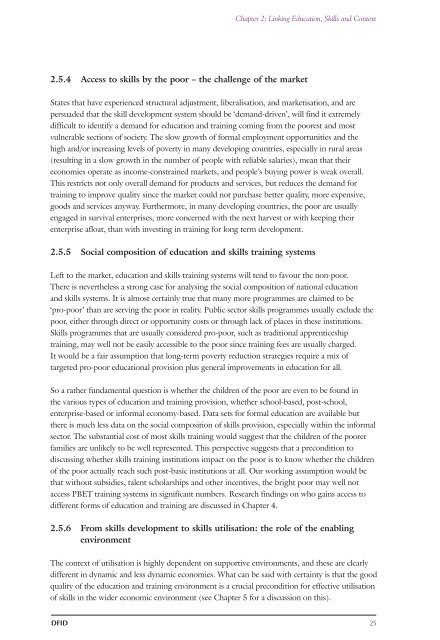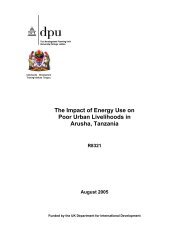Educating out of Poverty? A Synthesis Report on Ghana, India ... - DfID
Educating out of Poverty? A Synthesis Report on Ghana, India ... - DfID
Educating out of Poverty? A Synthesis Report on Ghana, India ... - DfID
Create successful ePaper yourself
Turn your PDF publications into a flip-book with our unique Google optimized e-Paper software.
Chapter 2: Linking Educati<strong>on</strong>, Skills and C<strong>on</strong>text<br />
2.5.4 Access to skills by the poor – the challenge <str<strong>on</strong>g>of</str<strong>on</strong>g> the market<br />
States that have experienced structural adjustment, liberalisati<strong>on</strong>, and marketisati<strong>on</strong>, and are<br />
persuaded that the skill development system should be ‘demand-driven’, will find it extremely<br />
difficult to identify a demand for educati<strong>on</strong> and training coming from the poorest and most<br />
vulnerable secti<strong>on</strong>s <str<strong>on</strong>g>of</str<strong>on</strong>g> society. The slow growth <str<strong>on</strong>g>of</str<strong>on</strong>g> formal employment opportunities and the<br />
high and/or increasing levels <str<strong>on</strong>g>of</str<strong>on</strong>g> poverty in many developing countries, especially in rural areas<br />
(resulting in a slow growth in the number <str<strong>on</strong>g>of</str<strong>on</strong>g> people with reliable salaries), mean that their<br />
ec<strong>on</strong>omies operate as income-c<strong>on</strong>strained markets, and people’s buying power is weak overall.<br />
This restricts not <strong>on</strong>ly overall demand for products and services, but reduces the demand for<br />
training to improve quality since the market could not purchase better quality, more expensive,<br />
goods and services anyway. Furthermore, in many developing countries, the poor are usually<br />
engaged in survival enterprises, more c<strong>on</strong>cerned with the next harvest or with keeping their<br />
enterprise afloat, than with investing in training for l<strong>on</strong>g term development.<br />
2.5.5 Social compositi<strong>on</strong> <str<strong>on</strong>g>of</str<strong>on</strong>g> educati<strong>on</strong> and skills training systems<br />
Left to the market, educati<strong>on</strong> and skills training systems will tend to favour the n<strong>on</strong>-poor.<br />
There is nevertheless a str<strong>on</strong>g case for analysing the social compositi<strong>on</strong> <str<strong>on</strong>g>of</str<strong>on</strong>g> nati<strong>on</strong>al educati<strong>on</strong><br />
and skills systems. It is almost certainly true that many more programmes are claimed to be<br />
‘pro-poor’ than are serving the poor in reality. Public sector skills programmes usually exclude the<br />
poor, either through direct or opportunity costs or through lack <str<strong>on</strong>g>of</str<strong>on</strong>g> places in these instituti<strong>on</strong>s.<br />
Skills programmes that are usually c<strong>on</strong>sidered pro-poor, such as traditi<strong>on</strong>al apprenticeship<br />
training, may well not be easily accessible to the poor since training fees are usually charged.<br />
It would be a fair assumpti<strong>on</strong> that l<strong>on</strong>g-term poverty reducti<strong>on</strong> strategies require a mix <str<strong>on</strong>g>of</str<strong>on</strong>g><br />
targeted pro-poor educati<strong>on</strong>al provisi<strong>on</strong> plus general improvements in educati<strong>on</strong> for all.<br />
So a rather fundamental questi<strong>on</strong> is whether the children <str<strong>on</strong>g>of</str<strong>on</strong>g> the poor are even to be found in<br />
the various types <str<strong>on</strong>g>of</str<strong>on</strong>g> educati<strong>on</strong> and training provisi<strong>on</strong>, whether school-based, post-school,<br />
enterprise-based or informal ec<strong>on</strong>omy-based. Data sets for formal educati<strong>on</strong> are available but<br />
there is much less data <strong>on</strong> the social compositi<strong>on</strong> <str<strong>on</strong>g>of</str<strong>on</strong>g> skills provisi<strong>on</strong>, especially within the informal<br />
sector. The substantial cost <str<strong>on</strong>g>of</str<strong>on</strong>g> most skills training would suggest that the children <str<strong>on</strong>g>of</str<strong>on</strong>g> the poorer<br />
families are unlikely to be well represented. This perspective suggests that a prec<strong>on</strong>diti<strong>on</strong> to<br />
discussing whether skills training instituti<strong>on</strong>s impact <strong>on</strong> the poor is to know whether the children<br />
<str<strong>on</strong>g>of</str<strong>on</strong>g> the poor actually reach such post-basic instituti<strong>on</strong>s at all. Our working assumpti<strong>on</strong> would be<br />
that with<str<strong>on</strong>g>out</str<strong>on</strong>g> subsidies, talent scholarships and other incentives, the bright poor may well not<br />
access PBET training systems in significant numbers. Research findings <strong>on</strong> who gains access to<br />
different forms <str<strong>on</strong>g>of</str<strong>on</strong>g> educati<strong>on</strong> and training are discussed in Chapter 4.<br />
2.5.6 From skills development to skills utilisati<strong>on</strong>: the role <str<strong>on</strong>g>of</str<strong>on</strong>g> the enabling<br />
envir<strong>on</strong>ment<br />
The c<strong>on</strong>text <str<strong>on</strong>g>of</str<strong>on</strong>g> utilisati<strong>on</strong> is highly dependent <strong>on</strong> supportive envir<strong>on</strong>ments, and these are clearly<br />
different in dynamic and less dynamic ec<strong>on</strong>omies. What can be said with certainty is that the good<br />
quality <str<strong>on</strong>g>of</str<strong>on</strong>g> the educati<strong>on</strong> and training envir<strong>on</strong>ment is a crucial prec<strong>on</strong>diti<strong>on</strong> for effective utilisati<strong>on</strong><br />
<str<strong>on</strong>g>of</str<strong>on</strong>g> skills in the wider ec<strong>on</strong>omic envir<strong>on</strong>ment (see Chapter 5 for a discussi<strong>on</strong> <strong>on</strong> this).<br />
DFID 25

















